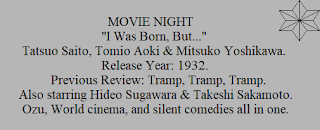
Review #1785: I Was Born, But...
Cast:
Tatsuo Saitō (Chichi), Tomio Aoki (Keiji, Younger Son), Mitsuko Yoshikawa (Haha, Yoshi's Wife), Hideo Sugawara (Ryoichi, Older Son), Takeshi Sakamoto (Juuyaku Iwasaki, Executive), Teruyo Hayami (Fujin, Iwasaki's Wife), Seiichi Kato (Kodomo, Taro), Shoichi Kofujita (Kozou, Delivery Boy), and Seiji Nishimura (Sensei, Teacher) Directed by Yasujirō Ozu.
Review:
“I started to make a film about children and ended up with a film about grownups; while I had originally planned to make a fairly bright little story, it changed while I was working on it …. The company hadn’t thought it would turn out this way. They were so unsure of it that they delayed its release for two months.”
The discussion over vaunted Japanese directors could be a lengthy one, but Yasujirō Ozu most certainly would be included early in the notations, one with a distinct style that captured a wry sense of life in his features that took his own pace to filmmaking. It was a viewing of the movie Civilization (1916) that inspired the Tokyo native to become a director. Although he had studied to become a teacher, these plans would soon scuttle for ambition to do film. He started with the Shochiku Film Company in 1923. He eventually moved from assistant directing to director by 1927, and he directed his debut feature with Sword of Penitence that year, although it is now lost, which is also the case with a number of his silent films. Incidentally, he did not make a sound film until 1936 (years after sound had come to Japan), and color wouldn't be seen in his films until the late 1950s. Ozu would do fifty-four films (for which over sixty percent survive) before he died at the age of sixty in 1963. He is regarded by many to be one of the most influential directors in world cinema.
Sometimes you need a movie [released as Umarete wa mita keredo] about what it is to be a kid. Sure, there are quite a few movies about kids dealing with stuff such as bullies, but one also has to deal with the other aspect of a messy growing childhood: seeing what your role models in a different light than once seen before. Ozu helped write the film alongside Geibei Ibushiya and Akira Fushimi; he would later essentially remake the film with Good Morning (1959). When it comes to lives of salarymen, sometimes their hierarchy really is like one seen in the schoolyard, complete with one select jester. In other words: it may be a coming-of-age movie, but that doesn't mean the journey is going to be a simple one, regardless of how much slapstick is present. Aoki (already familiar with Ozu after working with him in 1929) and Sugawara make an interesting group of kids to follow, ones who play well to what Ozu wants to say about human nature, whether one lives in the suburbs or in the distance. The movie takes its time with the kids, making sure that the horseplay (i.e. teasing) goes where it needs to with playful energy that reverberates well for anyone with a childhood without serving as an earworm itself in a game of memory. It is quite an amusing film in its 90 minute runtime that also manages to make a worthy drama come out of the edges. The kids don't need to contort into cliches or sentimentality to make its story hit any more than it needs to (i.e. one with skipping, forgery, and finding a bigger kid to fight battles). Saito proves the correct adult presence to match with the two kids, wrapped in patience and timing that doesn't become wrapped in the trap that comes in select coming-of-age films that turn the adult into outright foolery. Of course, that comes with sequence involving the kids and adults coming together to see a print together of antics in the workplace, which sets up the climax soon enough. It reveals the nature of what comes with the workplace sometimes: you can be a fair-minded parent that tries to do well for their kid, but it could all come unloose if they don't see you as the powerful figure in front of others. Kids are probably more worried about eating sparrow's eggs to get bigger before they will worry about their parent's job, but the quirks of growing up mean one has to see certain things up close, messy or not. Disappointment is inevitable in life for children, but it is the journey in trying to see past it that matters most (the notation for what the kids want to be growing up certainly proves that, particularly with the time made). As a whole, this is quite an interesting film, one that is packed with wry charm that fits well within telling a story of useful wit for both children and adults.
Overall, I give it 9 out of 10 stars.

No comments:
Post a Comment